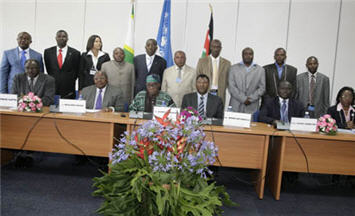
Negotiators between the Congolese government and a rebel group in the country's east have reached a preliminary agreement, after talks in the eastern town of Goma. Neither side has released details of the discussion, which would only set the stage for future peace negotiations.
Negotiations between the National Congress for the Defense of the People, an ethnic Tutsi rebel group operating in eastern Democratic Republic of Congo, and the Congolese government resumed last Wednesday. Following Sunday's discussions, spokesmen for both sides indicated they had reached a preliminary agreement.
The talks are the first between the two sides since the rebels' leader, Laurent Nkunda, was arrested by Rwanda, his former backer, last month.
Details of the talks have not been made public, but a government spokesman indicated they were the product of the work of two committees, one on political and security issues, and one on social and humanitarian issues. He said a report would be sent to President Joseph Kabila and to the mediators.
Future discussions on a peace accord would likely be facilitated by former Nigerian president Olusegun Obasanjo, who facilitated the last round of negotiations in Nairobi.
A researcher at the Institute for Security Studies in South Africa, Henri Boshoff, says the two sides likely discussed options for disarming and integrating the CNDP rebels into the government security forces. He says the discussions are also thought to be addressing governing and security arrangements for eastern Congo.
"Surely they will ask especially on the involvement and participation on governance in the provincial level and the local level. They are not looking at the national level, they are just looking at the provincial and local level," says Boshoff.
Meanwhile, two separate military operations against two of the other armed groups operating in eastern DRC are set to wind down in the coming week.
Since December, the Ugandan military, along with the DRC and Southern Sudan, has been leading an operation against the Lords Resistance Army in northeastern Congo.
The campaign, which has had support from the United States military, has come under fire from humanitarian organizations for its failure to prevent retaliations by the rebels against civilians, some 900 of whom have been brutally killed since the operation began.
At the same time the leader of a civil society organization in Dungu, which has seen some of the worst attacks, told the U.N. radio station in the Congo that Ugandan troops should be allowed to stay, saying civilians would be left vulnerable to the LRA soldiers still at large. The Ugandan military has said it will respect the Congolese government's request for the operation to end in February, though there have also been reports that Uganda is eager to continue pursuing the rebels.
To the South, in North Kivu province, Rwandan troops have been pursuing members of the Democratic Liberation Forces of Rwanda, a Rwandan-Hutu militia, many of whose members participated in that country's 1994 genocide. Rwandan troops are set to begin withdrawing Wednesday, though Congolese troops may continue to pursue the militia.
The militia has also been accused of retaliatory attacks on civilians. At least 100 people have been killed, according to human-rights groups, and the United Nations says rapes, looting and kidnapping continue regularly.
Related articles
- • 'Deadly environment' plus 'political and social' obstacles hinder Ebola fight, Security Council hears (July 24, 2019)
- • Ebola outbreak declared an international Public Health Emergency (July 17, 2019)
- • Felix Tshisekedi Sworn In as DR Congo President (January 24, 2019)
- • Constitutional Court Declares Tshisekedi Winner of Presidential Election (January 19, 2019)
- • Felix Tshisekedi Vows to Be the President of All Congolese (January 10, 2019)
- • Felix Tshisekedi Elected DR Congo President (January 10, 2019)
- • DR Congo Delays Results of December Election (January 6, 2019)
- • Botswana Urges Joseph Kabila to Step Down (February 26, 2018)
- • No elections in DR Congo in December without electronic voting machines: INEC (February 13, 2018)
- • US Warns DR Congo Against Electronic Voting for Delayed Election (February 12, 2018)
- • Felix Tshisekedi accuses INEC of illegally prolonging Kabila's mandate (October 24, 2017)
- • DRC Seeks Arrest of Presidential Candidate Moise Katumbi (May 19, 2016)
- • Papa Wemba Is Buried in Kinshasa (May 4, 2016)
- • Papa Wemba Awarded Highest National Honor as Thousands Pay Tribute (May 2, 2016)
- • UN Report Blames Ugandan Islamists for 237 Killings in DR Congo (May 14, 2015)
- • Rights Groups: DR Congo Must Free Pro-democracy Activists (April 13, 2015)
- • Police Open Fire on Crowd Protesting Election Law Change (January 19, 2015)
- • Violence in North Kivu Kills 21, Mostly Women, Children (October 18, 2014)
- • Etienne Tshisekedi Evacuated to Belgium for Medical Treatment (August 16, 2014)
- • Kerry Calls on Kabila to Honor Constitution (May 4, 2014)
- • Kerry in DR Congo for Security Talks (May 3, 2014)
- • Security Council extends UN mission, intervention force in DR Congo for one year (March 28, 2014)
- • Death toll in Lake Albert boat accident rises to 251 (March 27, 2014)
- • U.S. sending more personnel to Uganda to hunt LRA leader Joseph Kony (March 24, 2014)
- • Death toll in Lake Albert boat accident rises to 108 people (March 24, 2014)
- • DR Congo Takes Chairmanship of COMESA at Summit in Kinshasa (February 26, 2014)
- • Bosco Ntaganda Attacked Civilians on Ethnic Grounds, ICC Prosecutor Says (February 10, 2014)
- • New DR Congo amnesty law welcomed by UN envoys (February 5, 2014)
- • Colonel Mamadou Ndala Is Killed in Ambush (January 2, 2014)
- • DR Congo, M23 Rebels Sign Declarations Marking End of Kampala Peace Talks (December 12, 2013)
Tags: |







